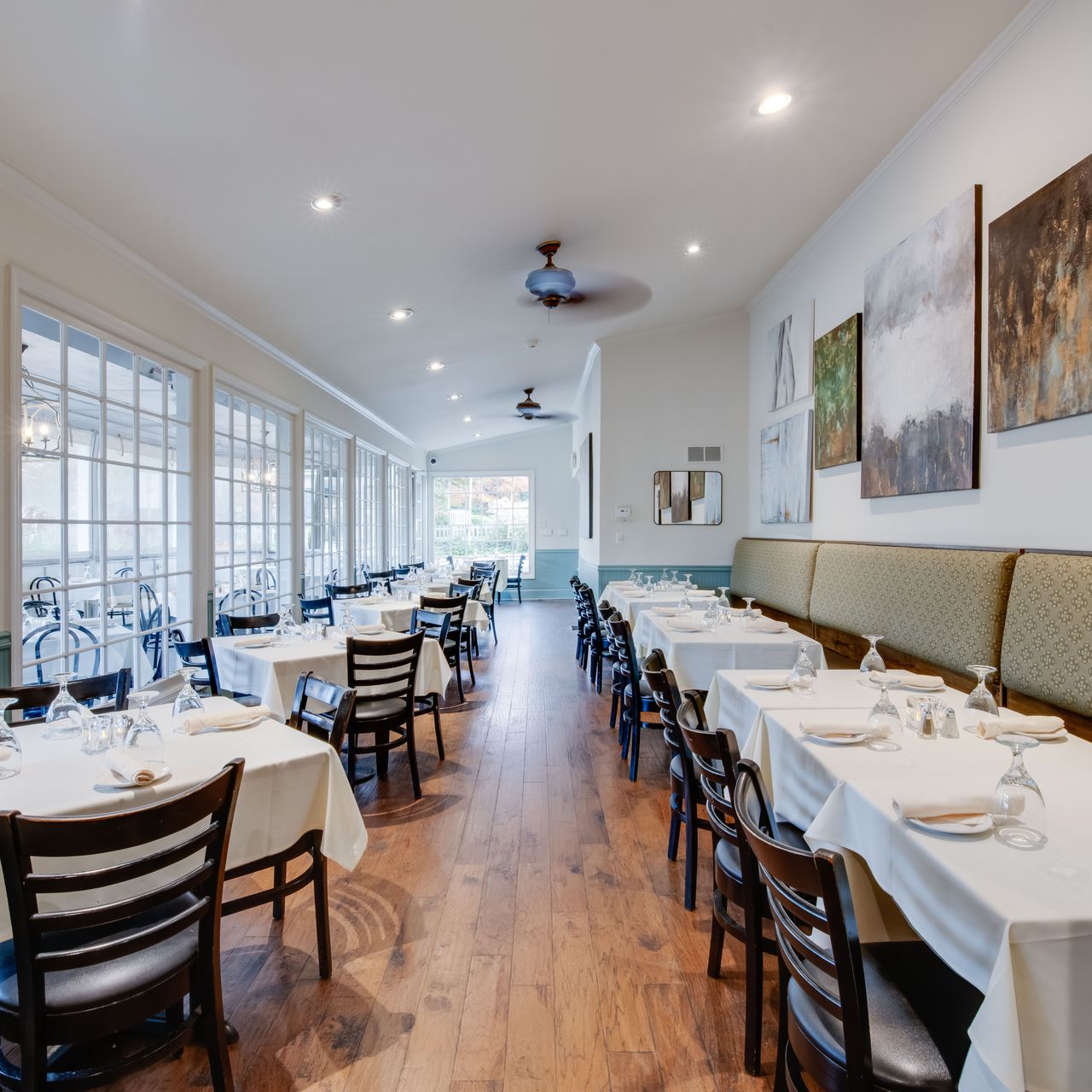Many restaurant owners and others across the industry struggled to thrive throughout the pandemic. In today’s challenging and rapidly changing marketplace, knowing what it takes to build and sustain a successful brand is essential.
Today on the Atlanta Small Business Show, we’re joined by 30-year restaurant operations veteran Lee Schulman, the Owner of Old Vinings Inn and President of Panacea Management Group. Schulman is also a Georgia Titan 100, an honor recognizing Georgia’s Top 100 CEOs and C-level executives.


Transcription:
Jim Fitzpatrick:
Thanks so much, Lee, for joining us on the show today.
Lee Schulman:
Thank you. Thanks, Jim.
Jim Fitzpatrick:
So you made it. You mad it through COVID, right? Things are going well?
Lee Schulman:
They are. They’re going really well. We just completed a full renovation of our attic bar, and in the last 18 months, renovated all the dining rooms at the Old Vinings Inn. So, it’s pretty much a brand new restaurant again. What’s old is what’s new, right? And COVID was, in a long-term way, really good to us. Obviously very hard in the beginning, pivoting quickly to to-go and carry out, but I think a lot of operators came through it having learned a great deal about their operations, about their people. Certainly, we’re in the hospitality business, so people are the most important part of what we do. And I think that was the big lesson that came out of COVID for a lot of operators, is that they really reevaluated the people, and their guests, and everyone, whether your internal or external customers, find valuable.
Jim Fitzpatrick:
Sure. Was there ever a time that you wondered if you’d make it?
Lee Schulman:
Absolutely. I had a second restaurant, Salt Yard, which I sold March 1st of 2020. And I saw things happening in China and the lockdowns that were happening, before they hit the United States. And I was fortunate enough to find a buyer for my second operation, I felt like. It looked like it would be a time to really have a low profile and stay lean and healthy during that period, and that did pay off.
Jim Fitzpatrick:
Sure. A number of the small business owners that I’ve spoken to over the last couple of years said that the PPP money that the government offered came in handy in a very, very big way. Did you find that to be the case, as well?
Lee Schulman:
Absolutely. It really did provide a lifeline for a lot of businesses.
Jim Fitzpatrick:
Yeah, for sure.
Lee Schulman:
And it was an important piece to come out stronger than when you came in.
Jim Fitzpatrick:
Right, right. Did you find many of your customers that are loyal to you and are loyal to your brand that you built there, and of course the incredible food, just came flowing back in when things were starting to be lifted?
Lee Schulman:
Absolutely. Last year probably was the best year I’ve ever had in the restaurant.
Jim Fitzpatrick:
Wow.
Lee Schulman:
And I had sales during the summertime, which is normally a very slow time of the year in the restaurant business, to be one of my best times. As you recall, last year about this time, we were coming out of lockdowns. Vaccines were really coming online. People have had their second shot at that point.
Jim Fitzpatrick:
Sure.
Lee Schulman:
And there was a lot of pent up demand, and people weren’t really comfortable traveling yet, but they were very comfortable coming out to dine.
Jim Fitzpatrick:
Yeah, yeah. And that’s great-
Lee Schulman:
I’m a neighborhood restaurant, so absolutely, they came out in droves.
Jim Fitzpatrick:
Sure. Now, one of the things we realize when we go to restaurants, and something that we hear about a lot in the media, is the fact that you restaurant owners are between a rock and a hard place with regard to hiring people and keeping people on for a number of different reasons out there. Whether it be government subsidies, or what have you, being given to workers or people that just said, “Hey, I don’t want to be in the public right now.” And others that just said, “You know what, this might be an opportunity to change careers altogether and take a little bit of a break.” How did you work through that? Talk to me about, was that challenging for you? Did you find that you had to turnover your staff? Did they stay with you? What did that look like?
Lee Schulman:
So, absolutely. I think every business, not just the restaurant business, has been extremely challenged by finding people that are willing to work and want to stay. In the beginning, maybe government subsidies had an impact on that, but not anymore. I think, especially with inflation compounding the need to pay your people more, there’s quite a bit of pressure on an operator right now to staff and to keep people. I would say a couple steps that I advise my clients in doing is having a really good system or procedure for screening your employees and taking a lot of time to speak to a candidate to understand what they really want out of a position. And is your organization able to fulfill the needs that that candidate might have, whether it’s pay or quality of life? Giving that candidate an opportunity to actually come into your operation and work with your people.
I really strongly encourage my clients to use the people, especially your long-term people that are already in your operation, to help you screen a potential candidate. So that you’re really getting a accurate and realistic picture of what that person can bring to your organization. And finally, taking the time to check back in with your people, especially your new folks. Taking an hour, sit down, have lunch with them. At the restaurant, we do a family meal every day and give the opportunity to everyone to have something to eat and have some community time with one another. So, I think the softer side of hiring people, softer skills that go into hiring people, are extremely critical right now. And of course with inflation, you’ve got to be able to pay people and offer them a package that’s going to entice them to stay long term. Turnover is one of the most expensive costs in a operation, and if you can really hold on to people and make them happy, I think that goes a long way to making your operation successful.
Jim Fitzpatrick:
Boy, there’s no question about it. With the increase in what some companies, the McDonald’s of the worlds out there and Chick-fil-A, that are paying 14, 15, in some cases $16 an hour, with a signing bonus. And I saw a sign at Starbucks the other day that said, “Well, we’ve got tuition reimbursement, a thousand dollars signing bonus, $15 an hour.” Does that wreak havoc on the restaurant industry that typically didn’t have to pay minimum wage, because people could go in, and workers could go in and make a lot of money each night in tips, right?
Lee Schulman:
Definitely. So, I think servers are what you’re talking about for the house staff.
Jim Fitzpatrick:
Sure.
Lee Schulman:
I think that’s always going to be easier than hiring the right back of the house staff. And having the right package, just like I said earlier, is really important. Small operators can be really creative in competing with larger operators, like McDonald’s, and Chick-fil-A, and other big corporations. For example, you can do a health insurance reimbursement rather than offering your own insurance. I found as a small operator that I can’t compete with the government packages that are available. And even a BlueCross BlueShield package for my small company is not really affordable. So I encourage my full-time people to go out and find something that fits their own lifestyle, and then they just get reimbursed from me each month for their insurance. So, there are other creative ways that you can entice people to stay on with you and make them happy.
Jim Fitzpatrick:
Sure. Now, we know that inflation at 9% that everybody is talking about. It’s got everyone very concerned. Obviously, it’s less money out of people’s pocket. Have you felt that in the industry? Where people are saying, “Hey, I just can’t afford to go out and drop a hundred bucks, or $150, on dinner,” or maybe more, because there’s a tightening. Now you happen to be in a very affluent area there, so I don’t know that it’s as big of an impact. However, have you seen any of that where, because of inflation and the rising cost of things, people have put a hold on how many times they may dine?
Lee Schulman:
That’s an interesting question, Jim. And I think what’s happened in some of the casual dining areas of the restaurant business, I think people have traded down. So if you were frequenting a fast casual operation like a Chipotle, you might be going more to a fast food operation, like McDonald’s, and you’re right. In the upper tier, people are less impacted by the inflation than people are in lower economic tiers. So, I think what’s happened is that, in the upper tier and upscale polish dining and above, I think people have become more attuned to value.
I think the way that’s manifested with inflation is that the feedback that you get now is everything’s really got to be just right. And if it’s not, the kind of comment that you’ll hear is, “Well, it wasn’t a five star, it was a four star. And my coffee wasn’t perfectly hot.” And it’s little things like that, that people become more attuned to, because they’re paying a $200 bill for two people with tip. So, there’s less room for error, I think. So, that’s definitely an added pressure point. But that being said, my guest counts are up.
Jim Fitzpatrick:
Yeah, that’s great.
Lee Schulman:
And I haven’t had to raise prices this year. I did raise prices last year, but so far so good. Prices are really still fluctuating a lot, and very recently, meat prices are on their way back down. Now, I do expect those to rise again with the supply of grain and cattle that are going to be available, but-
Jim Fitzpatrick:
But you haven’t passed that along to your guests in the restaurant?
Lee Schulman:
I haven’t had to, because I’ve been able to work with my vendors and continue to outsource products in a way that I’m not sacrificing quality. But at the same time, I’m providing a even greater value to our guests.
Jim Fitzpatrick:
As you know, the affluent crowd is just as aware, if not more, of a dollar more for a steak, or two bucks more for a salad than they paid last month, or maybe even last year. And they’re looking at it going, “Wait a minute. I thought that was $29.95, not $34.95,” right?
Lee Schulman:
That’s right, Jim. And again, our guests in the upper echelon are saying to themselves, “That was a $36 filet, but man was that great” into that. And at the lower tier, folks are saying, “Man, that’s a $36 stake. I’m going to go somewhere else where I can get a same stake of similar quality, maybe a little bit less, for less money.”
Jim Fitzpatrick:
Sure. There has been a number of people, myself included, that I find myself feeling bad for the servers and the restaurant industry as a whole, at least in the last couple of years when COVID was around. So, I wanted to go out more. I wanted to, for the restaurants that were open, to give my business to those restaurants that have been around, and that my wife and I would always frequent. And it was our way of giving back in a very, very small way, but also maybe a little bit more on the tip for our server. And because we know that you all in the restaurant business took just an incredible hit. Have you found that to be the case, that people have come in and said, “Hey, we appreciate you hanging in?”
Lee Schulman:
I a hundred percent agree with that. There’s definitely much more empathy out there for servers and people that are in the service industry, whether it’s a restaurant server, a dishwasher. I think there’s a greater appreciation after COVID for what folks provide the service. I think, and I hope, that attitudes about service and people in the industry are changing. I think people in the service business and in the service industry have often felt that they were a class below, and that their service was servitude and not service, which serving others is one of the greatest honors person can do.
Jim Fitzpatrick:
Sure. Yeah, no question. We’ve spoken to a couple of your colleagues in the industry over the last couple of months. Kevin Gillespie, or Robbie Cokeler, I think his name is, from Fifth Group, and runs a number of successful restaurants here. And they said that they couldn’t believe that there was this incredible business out there on their to-go side, where now they’re in a very big way. They embrace it, they’re doing everything they can to build it. Do you fall in line with them, or have you found that, “Wow, all these people are now coming to us on a takeout basis? Let’s keep that going?”
Lee Schulman:
Absolutely. It’s incremental business. The margins on it are not as good as what the dine-in business is, especially if you’re using a third party app UberEats or DoorDash, but not having that business isn’t helpful. So, it’s here to stay. The convenience factor and anything that can be done to maximize those margins and minimize the wait times and any inconvenience that is perceived by the guest is going to be helpful. It’s always preferable to have someone come in and experience your food and your service in house. That’s the foundation upon which restaurants were built, but also convenience is a service to the guest. So, without a doubt it’s here to say. And one of the things that I focus on with clients is helping them build in platforms that are simple for the guests to use and access, as well as simplifying the ease and service on the inside of the operation.
Jim Fitzpatrick:
Sure. What do you say to the people that are watching you right now that are thinking about taking some of their life savings and opening up a restaurant? You’re a very successful restaurateur here in Atlanta. There’s a lot of people that look at you and say, “Man, I’d love to be living that guy’s life, and look at the incredible restaurant. And it looks like so much fun, and I’m ready to do that.” A, is it a good time to open up a business or a restaurant? And B, what advice would you have for that individual that’s listening to us?
Lee Schulman:
I think the first piece of advice that I’d say is the grass isn’t always greener on the other side. It’s just green.
Jim Fitzpatrick:
That’s right. Be ready to work.
Lee Schulman:
Correct, and with that being said, I would say, if you’ve not worked in a restaurant before, go get a job in a restaurant and work in the back of the house and the front of the house. And I think anyone thinking about getting in the business is probably very passionate about the food, or the service, or providing comfort to others. I think that’s where it has to start, from your heart.
Jim Fitzpatrick:
Just because you like to go to a nice restaurant and have a good dinner and enjoy yourself doesn’t make you a restaurant guy or girl.
Lee Schulman:
Of course. Of course. Absolutely, but there’s always room for people that have that passion to get in this business. So, I would never stand in the way of someone’s passion, or-
Jim Fitzpatrick:
You think these economic times, and specifically here in Atlanta, you think it’s okay to go out and invest in a business right now?
Lee Schulman:
I think it is. I think there’s room in a lot of different places within the hospitality industry for growth right now. And you see that, even despite the financial headwinds that are out there, it’s unbelievable how many new openings there are right now. I would say there’s a great shortage of secondhand restaurants. Restaurants that have closed, that are already equipped, that are almost turnkey. And I think that, that’s a sign too. I think there’s a lot of places doing well right now.
Jim Fitzpatrick:
Yeah. Friend of mine just signed on a lease of a restaurant that’s completely up and ready to go. The kitchen, the freezers, everything’s in. The last company didn’t make it, and the landlord said, “Look, I’ll give you your first year free. Just get in there and get going. You got one year free. Just worry about your food costs and your help. And I got the rest.” Huge opportunity. They’re doing great.
Lee Schulman:
Yeah, that’s fantastic, and when you can get into that kind of situation. First of all, it’s not common right now. And secondly, that’s a fantastic way to get in.
Jim Fitzpatrick:
Yeah. So look, talk to me about your company. Are we going to see any expansion? If you’ve got a successful restaurant, as you do, and you’re a young guy there. Are you look around for that next big win?
Lee Schulman:
Well, thanks Jim. I really appreciate that compliment, and also I’m looking to maximize the operation that I have right now. I started a consulting company, because I’m passionate about helping others. And I like to work with people that like to be worked with and learn, and in turn, I can learn from them. So Panacea Management Group Consulting was founded on those principles, and I’ve taken a lot of enjoyment and pride in helping some other operations out there get up and going and make that-
Jim Fitzpatrick:
That’s outstanding. Is your consultation mostly in the area of restaurants?
Lee Schulman:
It is.
Jim Fitzpatrick:
So that is fantastic. For those that are listening to us have this conversation, that are even thinking about opening up a restaurant, or maybe you’ve opened up a restaurant, and it’s not quite getting some traction, Lee might be the best call you could make. It’s always good to hear and learn from somebody that’s out there doing it and winning at it. And I know that that’s helped me in my career, and when I’ve gotten into trouble in businesses or even when I thought about businesses. I wanted to sit down with somebody like you, not in the restaurant business, but in other businesses and say, “Hey, give me the skinny on this deal. Where do you think I’m missing it?” So, I would encourage those that are listening to us have this conversation, reach out to Lee and say, “Hey, let’s have a cup of coffee, meet at Starbucks and tell me where you can help me.”
And I’m sure if he can’t help you, I’ll tell you that too. But you’ve been doing it long enough, Lee, with a very successful restaurant with Old Vinings INN, as many people know. So that’s great, that’s fantastic. It’s exactly the kinds of solutions that we want to bring here at The Atlanta Small Business Show. For those that are thinking about the restaurant business, this may be the guy that you’re looking for. So, Lee Schulman, owner of Old Vinings Inn, president of Panacea Management Group, might be your next best friend, if you’re thinking about getting into the restaurant business. So, thank you so much, hopefully we can do a follow up to see how things are going.
Lee Schulman:
Love to. Thanks for your time, Jim. Pleasure.
Jim Fitzpatrick:
Great, thank you.
The Atlanta Small Business Network, from start-up to success, we are your go-to resource for small business news, expert advice, information, and event coverage.
While you’re here, don’t forget to subscribe to our email newsletter for all the latest business news know-how from Atlanta Small Business Network.







